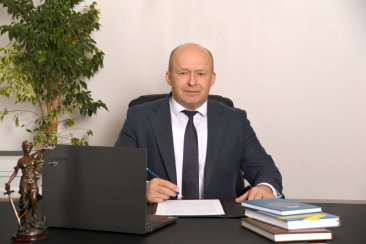Contact center of the Ukrainian Judiciary 044 207-35-46

This was stated by Mykhailo Smokovych, President of the Administrative Cassation Court within the Supreme Court, at the VII International Scientific-Practical Conference "Modern Challenges and Current Issues of Judicial Reform in Ukraine".
"The war has posed challenges to the justice system that require an immediate, effective and professional response," said the President of the Administrative Cassation Court of the Supreme Court, describing how the consideration of cases under martial law has changed.
The courts in the territories occupied by the Russian Federation have faced many challenges, including the resumption of lost court cases, the expansion of the categories of cases in the form of written proceedings, damage and destruction of court premises, and threats to the safety of judges and court staff. There are also difficulties in summoning people to court, especially when they are in the occupied territories. In the light of security concerns, the territorial jurisdiction of the courts in the occupied territory or in the area of hostilities was changed in order to ensure the administration of justice.
During the scientific-practical conference, Mykhailo Smokovych informed the audience about the positive results of the introduction of e-Justice in Ukraine and the digitalisation of the judicial process. In particular, he recalled that the Law of Ukraine "On Amendments to Certain Legislative Acts of Ukraine on Mandatory Registration and Use of Electronic Offices in the Unified Judicial Information and Telecommunication System or its separate subsystem (module) Ensuring Document Exchange" came into force on 18 October 2023. This law requires all legal entities to register their electronic accounts with UJITS. At the same time, the legislator has also provided for circumstances in which certain entities cannot have an electronic account in the System.
The Head of the Administrative Cassation Court of the Supreme Court paid particular attention to the discussion of the issue of renewal and extension of procedural deadlines. He emphasized that public authorities cannot consider the introduction of martial law in Ukraine as an unconditional and sufficient reason for recognizing a missed procedural deadline as valid.
Mykhailo Smokovych also said that since the beginning of Russia's full-scale invasion of Ukraine, the Administrative Cassation Court of the Supreme Court has adopted a number of important legal positions. These include positions on the possibility of granting an early old-age pension to a person with the status of a combatant who is not a military serviceman; granting the status of a child affected by military operations and armed conflicts; granting the status of a person covered by the status of a war veteran and guarantees of social protection to a family member of a deceased person with a war disability, etc.
The President of the Administrative Cassation Court emphasized that cases regarding the state's provision of social protection for Ukraine's defenders in the war against the aggressor country, along with the families of deceased war veterans, are now given top priority for consideration.
The speaker also informed that on 15 December 2023, the Law of Ukraine "On Administrative Procedure" will come into force, which regulates the relations of executive authorities, authorities of the Autonomous Republic of Crimea, local governments, their officials, other entities authorised by law to perform public administration functions, with individuals and legal entities regarding the consideration and resolution of administrative cases in the spirit of a democratic and legal state as defined by the Constitution of Ukraine and in order to enforce the law, as well as the state's obligation to ensure and protect rights, freedoms and legal interests of persons and citizens. The law complies with all the provisions of the European Union Charter of Fundamental Rights, the principles of administrative procedure, including the ECtHR's conclusions on the procedure of the principle of good governance.
"This is an important step both for administrative justice and for the protection of rights and freedoms in administrative proceedings," said Mykhailo Smokovych.